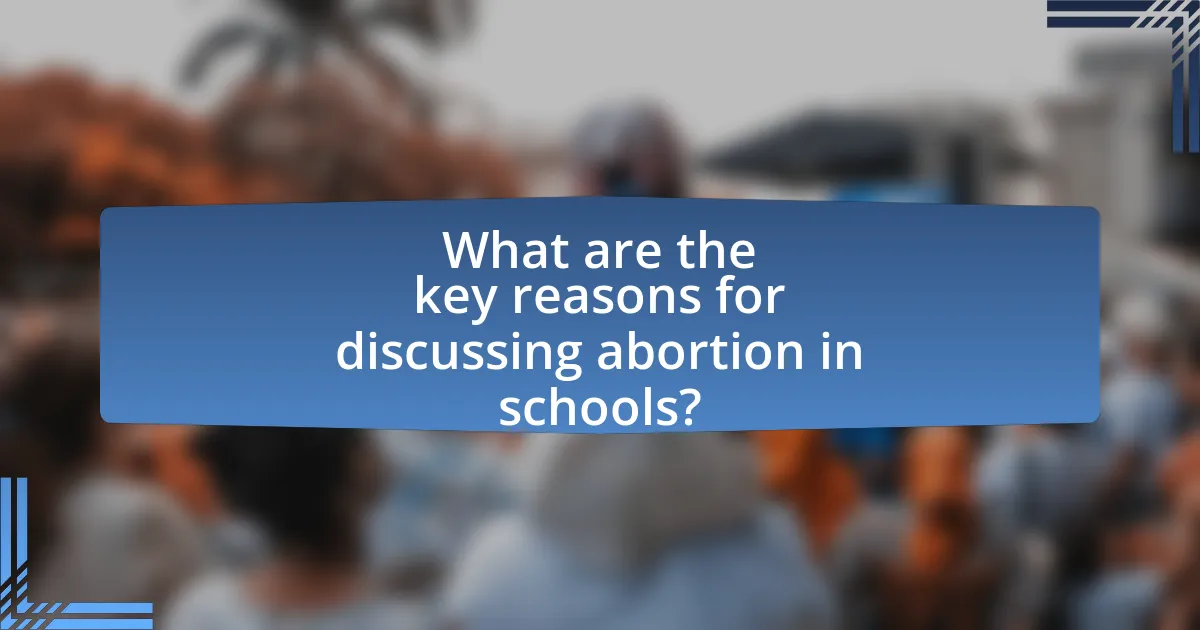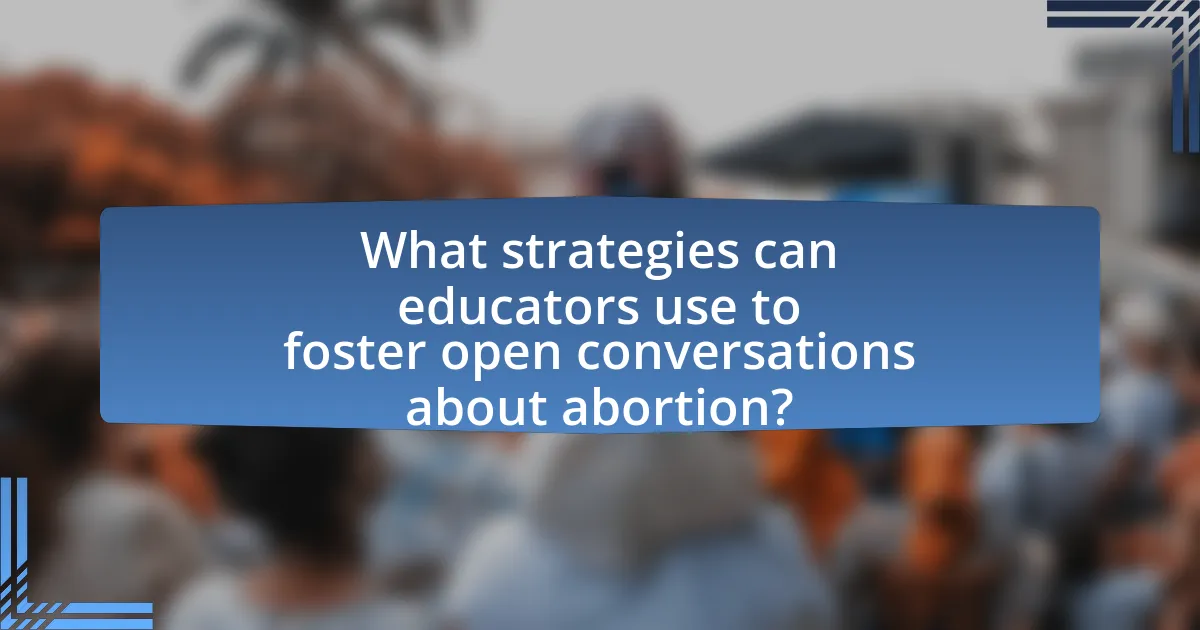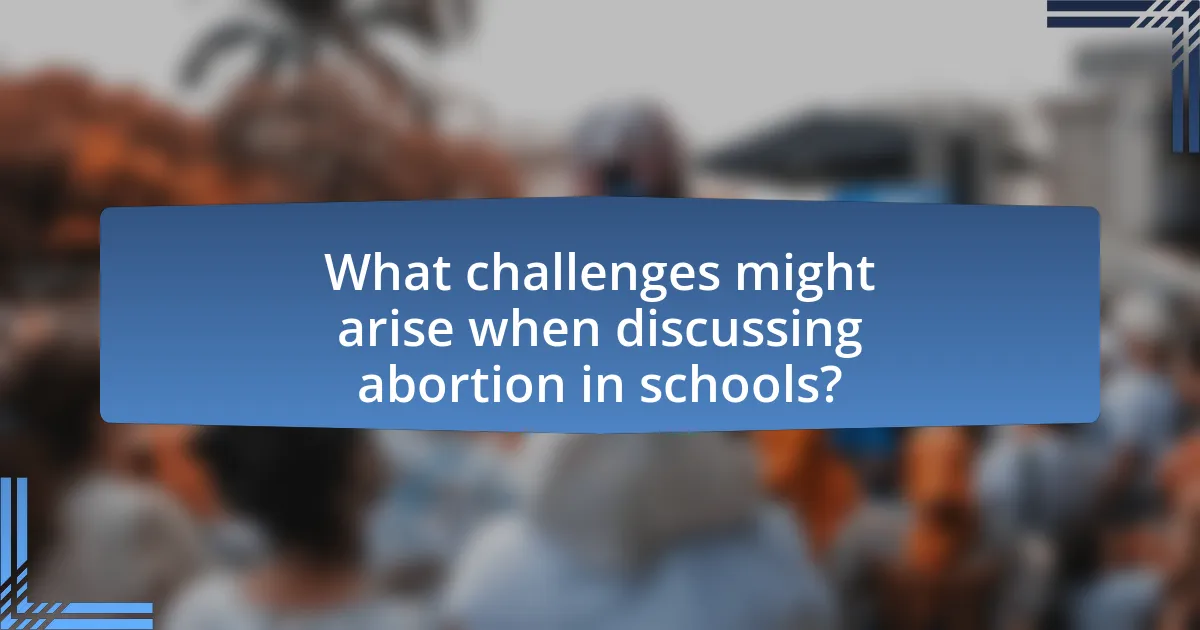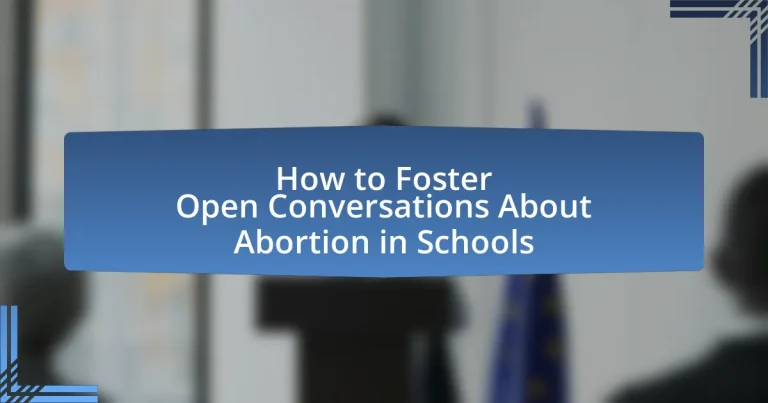The article focuses on fostering open conversations about abortion in schools, emphasizing the importance of comprehensive sex education to promote informed decision-making among students. It highlights the benefits of discussing abortion, such as reducing stigma, enhancing critical thinking, and addressing knowledge gaps regarding reproductive rights. The article outlines strategies for educators to create safe and inclusive environments for dialogue, the role of emotional safety in discussions, and the necessity of accurate information to combat misinformation. Additionally, it addresses the challenges educators may face, including differing beliefs and parental concerns, while advocating for best practices to ensure effective and respectful conversations on this sensitive topic.

What are the key reasons for discussing abortion in schools?
Discussing abortion in schools is essential for promoting informed decision-making among students. Education on abortion helps students understand reproductive rights, the implications of unintended pregnancies, and the importance of safe and legal access to abortion services. Research indicates that comprehensive sex education, which includes discussions about abortion, leads to lower rates of unintended pregnancies and sexually transmitted infections among adolescents. Furthermore, open conversations about abortion can reduce stigma and misinformation, fostering a supportive environment for students to seek help and guidance.
How can open conversations about abortion benefit students?
Open conversations about abortion can benefit students by fostering critical thinking and informed decision-making. Engaging in discussions allows students to explore diverse perspectives, understand the complexities of reproductive rights, and develop empathy towards differing viewpoints. Research indicates that comprehensive sex education, which includes discussions about abortion, leads to better health outcomes and reduces stigma associated with reproductive choices. For instance, a study published in the Journal of Adolescent Health found that students exposed to open dialogues about sexual health are more likely to make informed choices regarding their bodies and relationships.
What knowledge gaps exist regarding abortion among students?
Knowledge gaps regarding abortion among students include a lack of understanding of the medical procedures involved, the legal rights surrounding abortion, and the emotional and psychological impacts of the decision. Research indicates that many students are unaware of the differences between medical and surgical abortions, with a study by the Guttmacher Institute revealing that only 30% of high school students could accurately describe the abortion process. Additionally, misconceptions about the legality of abortion in various states contribute to confusion, as many students do not know their rights or the resources available to them. Furthermore, there is often insufficient discussion about the emotional ramifications of abortion, leading to a lack of support for those who may experience complex feelings post-procedure.
How can discussions promote critical thinking and empathy?
Discussions promote critical thinking and empathy by encouraging individuals to engage with diverse perspectives and analyze complex issues. When participants share their viewpoints, they are prompted to evaluate their own beliefs and consider alternative arguments, which enhances critical thinking skills. Research indicates that dialogue fosters understanding and reduces biases, as seen in studies like “The Role of Dialogue in Fostering Empathy” by K. M. Kahn and J. M. Hargreaves, which highlights how structured conversations can lead to greater emotional awareness and connection among participants. This process not only sharpens analytical abilities but also cultivates a deeper sense of empathy, as individuals learn to appreciate the experiences and emotions of others.
Why is it important to create a safe space for these conversations?
Creating a safe space for conversations about abortion in schools is crucial because it encourages open dialogue and reduces stigma. When students feel secure, they are more likely to express their thoughts and concerns without fear of judgment or backlash. Research indicates that safe environments promote emotional well-being and facilitate better understanding of complex issues, as highlighted in a study by the American Psychological Association, which found that supportive settings enhance communication and learning outcomes. Thus, establishing a safe space is essential for fostering informed discussions and supporting students’ emotional health regarding sensitive topics like abortion.
What role does emotional safety play in student discussions?
Emotional safety is crucial in student discussions as it fosters an environment where students feel secure to express their thoughts and feelings without fear of judgment or ridicule. When students perceive their emotional safety is prioritized, they are more likely to engage openly, share diverse perspectives, and participate actively in discussions, particularly on sensitive topics like abortion. Research indicates that classrooms that emphasize emotional safety lead to increased student engagement and improved learning outcomes, as students are more willing to take intellectual risks. For instance, a study published in the Journal of Educational Psychology found that emotional safety significantly correlates with students’ willingness to contribute to discussions, enhancing their overall educational experience.
How can schools ensure inclusivity in conversations about abortion?
Schools can ensure inclusivity in conversations about abortion by creating a safe and respectful environment that encourages diverse perspectives. This can be achieved through implementing comprehensive sex education programs that include discussions on reproductive rights, ensuring that materials reflect various cultural, religious, and personal beliefs. Research indicates that inclusive curricula lead to better understanding and acceptance among students, as seen in studies conducted by the Guttmacher Institute, which highlight the importance of addressing diverse viewpoints in educational settings. Additionally, training educators to facilitate open dialogues and actively listen to students’ concerns fosters an atmosphere of trust and respect, further promoting inclusivity in these sensitive discussions.

What strategies can educators use to foster open conversations about abortion?
Educators can foster open conversations about abortion by creating a safe and respectful classroom environment that encourages dialogue. This involves establishing ground rules for discussions, such as confidentiality and respect for differing opinions, which can help students feel secure in expressing their thoughts. Additionally, incorporating comprehensive sex education that includes information about reproductive rights and health can provide students with factual knowledge, enabling informed discussions. Research indicates that when students are educated about these topics, they are more likely to engage in meaningful conversations (Guttmacher Institute, 2020). Furthermore, educators can utilize discussion prompts and case studies to facilitate critical thinking and empathy, allowing students to explore various perspectives on abortion.
How can educators approach the topic sensitively?
Educators can approach the topic of abortion sensitively by creating a safe and respectful environment for discussion. This involves establishing ground rules that promote open dialogue while respecting diverse perspectives. Research indicates that when educators facilitate conversations with empathy and active listening, students feel more comfortable expressing their views (Gonzalez et al., 2020). Additionally, providing accurate information and resources can help demystify the topic and reduce stigma, fostering a more informed and compassionate discourse.
What language should educators use to discuss abortion effectively?
Educators should use neutral, inclusive, and fact-based language to discuss abortion effectively. This approach fosters a respectful environment where diverse perspectives can be shared. Research indicates that using non-judgmental terminology and avoiding emotionally charged words helps students feel safe to express their views. For instance, terms like “termination of pregnancy” rather than “killing” can reduce stigma and promote understanding. Additionally, incorporating evidence-based information, such as statistics on abortion rates and health implications, supports informed discussions. This method aligns with educational best practices that emphasize critical thinking and empathy in sensitive topics.
How can educators address diverse perspectives on abortion?
Educators can address diverse perspectives on abortion by creating a safe and inclusive environment for discussion. This involves establishing ground rules that promote respect and understanding, encouraging students to share their views while also listening to others. Research indicates that open dialogue can enhance critical thinking and empathy among students, as seen in studies like “The Role of Dialogue in Education” by K. A. Kahn and J. M. Hargreaves, which highlights the benefits of discussing controversial topics in educational settings. By incorporating diverse materials and perspectives, educators can facilitate informed discussions that acknowledge the complexity of the issue, allowing students to explore various viewpoints while grounding conversations in factual information.
What resources are available to support these conversations?
Resources available to support conversations about abortion in schools include educational materials, training programs, and online platforms. Organizations such as the Guttmacher Institute provide research and data on reproductive health, which can inform discussions. Additionally, the National Abortion Federation offers resources for educators to facilitate conversations about abortion in a respectful and informative manner. These resources are designed to equip educators and students with accurate information and promote understanding, thereby fostering open dialogue in school settings.
Which organizations provide educational materials on abortion?
Organizations that provide educational materials on abortion include Planned Parenthood, the Guttmacher Institute, and the American College of Obstetricians and Gynecologists (ACOG). Planned Parenthood offers comprehensive resources on reproductive health, including abortion education. The Guttmacher Institute conducts research and provides data on sexual and reproductive health, including abortion statistics and policy analysis. ACOG publishes guidelines and educational materials aimed at healthcare professionals, ensuring accurate information is available regarding abortion procedures and care. These organizations are recognized for their contributions to public education and advocacy on reproductive rights.
How can technology facilitate discussions about abortion in schools?
Technology can facilitate discussions about abortion in schools by providing accessible platforms for information sharing and dialogue. Online forums, educational apps, and virtual classrooms enable students to engage with diverse perspectives and resources related to abortion. For instance, platforms like Google Classroom allow educators to share curated content, including articles and videos, which can help students understand the complexities of the topic. Additionally, anonymity features in online discussions can encourage students to express their views without fear of judgment, fostering a more open and honest conversation. Research indicates that digital tools can enhance student engagement and understanding of sensitive topics, making them effective for discussions about abortion.

What challenges might arise when discussing abortion in schools?
Discussing abortion in schools may lead to challenges such as differing beliefs among students, parents, and educators, which can create a contentious atmosphere. These differing beliefs often stem from cultural, religious, and personal values, leading to potential conflicts during discussions. Additionally, the lack of comprehensive sex education in many school curricula can result in misinformation, making it difficult for students to engage in informed discussions. Furthermore, legal restrictions in certain regions may limit the ability of educators to address the topic openly, hindering the development of critical thinking and understanding among students.
How can educators navigate parental concerns about abortion discussions?
Educators can navigate parental concerns about abortion discussions by establishing clear communication channels and providing educational resources. Engaging parents through informational meetings can help clarify the curriculum’s objectives and the importance of discussing reproductive health topics, including abortion, in a factual and age-appropriate manner. Research indicates that comprehensive sex education, which includes discussions about abortion, can lead to better health outcomes for students, as noted in the Journal of Adolescent Health. By addressing parental concerns directly and offering evidence-based information, educators can foster a collaborative environment that prioritizes student well-being and informed decision-making.
What strategies can be employed to communicate with parents effectively?
To communicate with parents effectively, schools should employ strategies such as regular updates, active listening, and creating a welcoming environment for dialogue. Regular updates through newsletters or emails keep parents informed about school activities and policies, fostering transparency. Active listening during meetings or conferences allows educators to understand parents’ concerns and perspectives, which builds trust. Creating a welcoming environment encourages parents to share their thoughts openly, making them feel valued and involved in their child’s education. Research indicates that effective communication between schools and parents leads to improved student outcomes, highlighting the importance of these strategies.
How can schools balance differing opinions on abortion within the community?
Schools can balance differing opinions on abortion within the community by implementing inclusive dialogue programs that encourage respectful discussions among students, parents, and faculty. These programs can include structured debates, workshops, and forums that allow participants to express their views while also listening to opposing perspectives. Research indicates that schools that foster open communication on sensitive topics, such as abortion, create a more understanding and empathetic environment, which can lead to reduced conflict and increased awareness of diverse viewpoints. For example, a study published in the Journal of School Health found that schools promoting open discussions on controversial issues saw improved student engagement and a greater sense of community.
What are the potential repercussions of avoiding the topic?
Avoiding the topic of abortion in schools can lead to significant repercussions, including a lack of understanding and misinformation among students. When educators do not address abortion, students may form misconceptions based on peer influence or media portrayals, which can result in stigmatization and fear surrounding the subject. Research indicates that comprehensive sexual education, which includes discussions about abortion, leads to better decision-making and reduces rates of unintended pregnancies (Guttmacher Institute, 2021). Furthermore, avoiding the topic can create an environment where students feel unsupported and unable to seek help or guidance when faced with related issues, ultimately impacting their mental health and well-being.
How can silence on abortion impact students’ understanding and decision-making?
Silence on abortion can significantly hinder students’ understanding and decision-making by limiting access to accurate information and diverse perspectives. When educational institutions do not address abortion openly, students may rely on misinformation or societal stigma, leading to confusion about reproductive health options. Research indicates that comprehensive sex education, which includes discussions about abortion, improves students’ knowledge and empowers them to make informed choices regarding their bodies and futures. For instance, a study published in the Journal of Adolescent Health found that students exposed to comprehensive sexual education were more likely to understand reproductive rights and make informed decisions compared to those who received no such education. Thus, silence creates a knowledge gap that can adversely affect students’ health outcomes and autonomy.
What are the risks of misinformation regarding abortion in schools?
Misinformation regarding abortion in schools poses significant risks, including the potential for students to develop misconceptions about reproductive health, which can lead to poor decision-making. For instance, inaccurate information may foster stigma and fear surrounding abortion, discouraging students from seeking necessary medical care or support. Studies indicate that comprehensive sexual education, which includes accurate information about abortion, can reduce rates of unintended pregnancies and sexually transmitted infections. Furthermore, misinformation can contribute to polarized views among students, hindering constructive dialogue and understanding on the topic. This lack of informed discussion can perpetuate societal stigma and limit access to accurate resources, ultimately affecting students’ health and well-being.
What best practices can educators implement for effective discussions on abortion?
Educators can implement best practices for effective discussions on abortion by creating a safe and respectful environment, encouraging critical thinking, and providing accurate information. Establishing ground rules for respectful dialogue helps students feel secure in expressing their views. Encouraging critical thinking involves prompting students to analyze various perspectives and the implications of abortion-related policies, fostering a deeper understanding of the topic. Providing accurate information, including statistics and research findings, ensures that discussions are grounded in factual content, which is essential for informed debate. For instance, studies show that comprehensive sex education, which includes discussions on abortion, can lead to more informed decision-making among students (Guttmacher Institute, 2020).
How can educators create lesson plans that incorporate abortion discussions?
Educators can create lesson plans that incorporate abortion discussions by integrating comprehensive sexual education curricula that include topics on reproductive rights, health, and ethics. This approach ensures that students receive factual information about abortion, its legal context, and the various perspectives surrounding the issue. Research indicates that inclusive sexual education can lead to informed decision-making among adolescents, as highlighted in the “National Sexuality Education Standards” published by the Future of Sex Education Initiative, which emphasizes the importance of discussing diverse viewpoints on reproductive health. By utilizing age-appropriate materials, fostering a safe classroom environment, and encouraging critical thinking, educators can facilitate respectful and informed discussions about abortion.
What role do student-led discussions play in fostering open conversations?
Student-led discussions play a crucial role in fostering open conversations by empowering students to express their perspectives and engage with diverse viewpoints. These discussions create a safe space for dialogue, encouraging participants to share personal experiences and challenge assumptions. Research indicates that when students lead conversations, they are more likely to feel ownership of the topic, which enhances their willingness to participate and listen actively. For instance, a study published in the Journal of Educational Psychology found that student-led discussions significantly increased engagement and critical thinking skills among participants, leading to a deeper understanding of complex issues, such as abortion. This approach not only promotes inclusivity but also cultivates a culture of respect and empathy, essential for discussing sensitive topics in educational settings.


